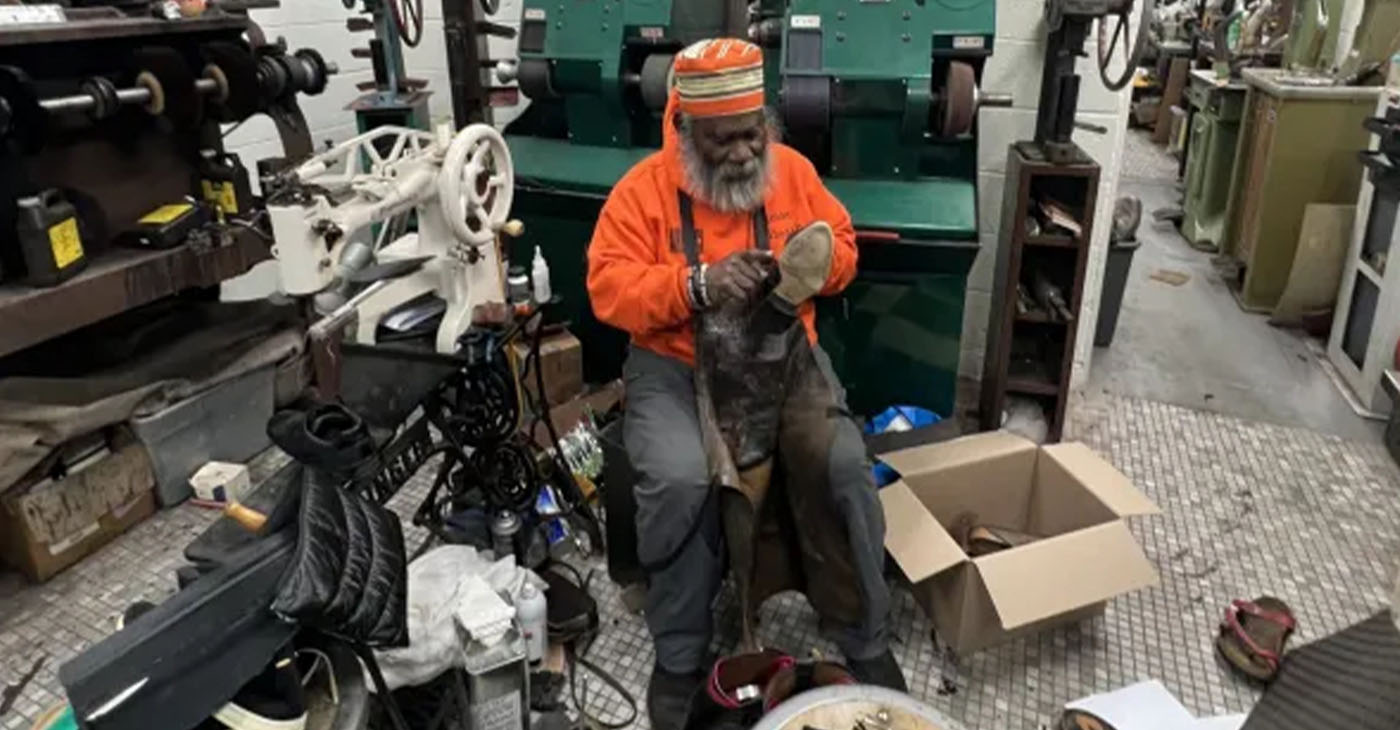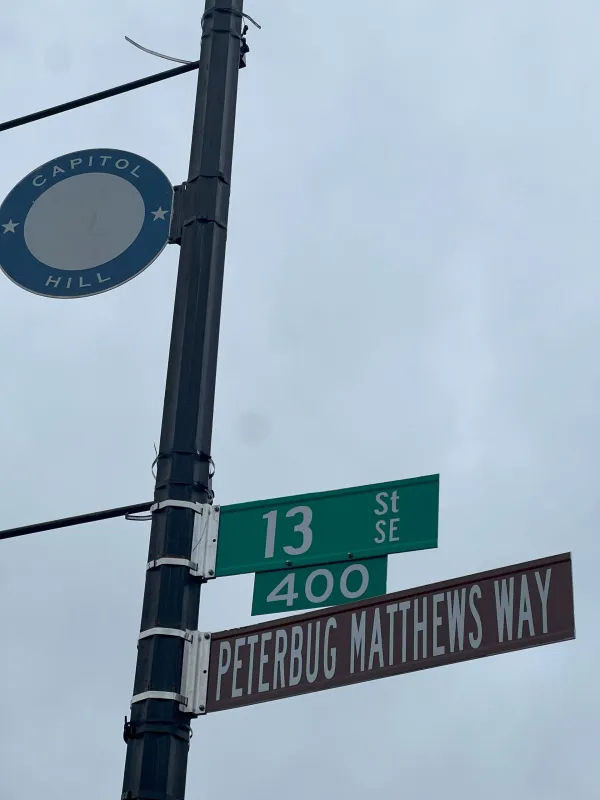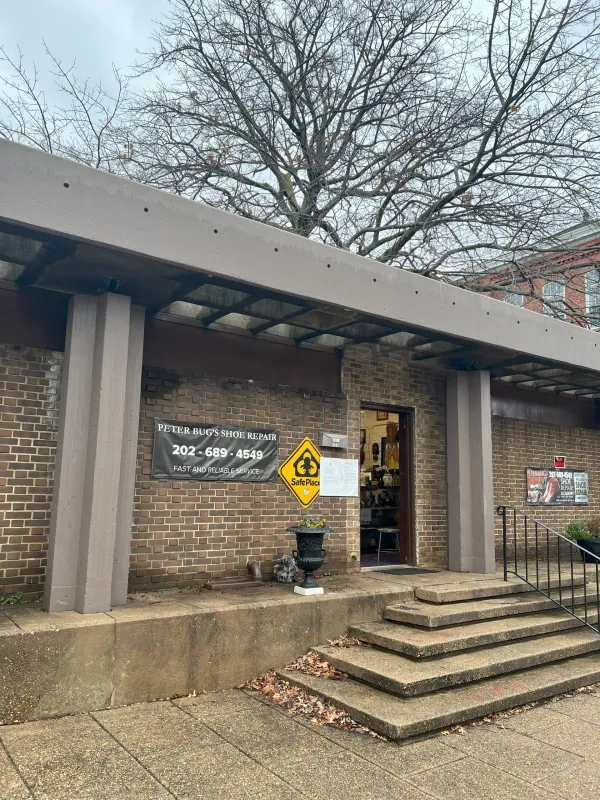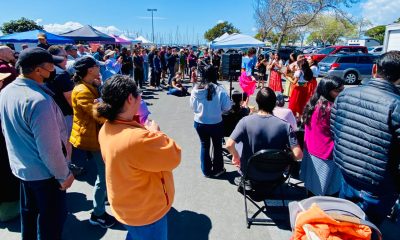#NNPA BlackPress
AFRO Spotlight on Black Excellence: Peter Bug Shoe Academy, Fixing Souls and Soles
THE AFRO — A native of Southeast D.C., John “Peter Bug” Matthews is a fifth-generation Washingtonian. He started his nonprofit, Peter Bug Shoe and Leather Repair in 1977. The small shop has since doubled as a cobbler academy — known as the Peter Bug Shoe Repair Academy — for neighborhood children seeking part-time, paid employment opportunities.
The post AFRO Spotlight on Black Excellence: Peter Bug Shoe Academy, Fixing Souls and Soles first appeared on BlackPressUSA.

By Mennatalla Ibrahim | Special to the AFRO
As the sun sets in the nation’s capital, painting the sky vibrant shades of reds and purples, John “Peter Bug” Matthews stands proudly outside his historic shoe shop on Capitol Hill. Even on his day off, Matthews is at the shop on his own, tirelessly repairing shoes for the community.
At 75, he wears a bright orange hoodie that matches the kufi cap on his head, a long, stained leather apron and a myriad of ethnic bracelets on either wrist. As he seamlessly works his way through the sea of tattered shoes sprawled across his floor, he tells origin stories of the African décor adorning the walls.
A native of Southeast D.C., Matthews is a fifth-generation Washingtonian. He started his nonprofit, Peter Bug Shoe and Leather Repair in 1977. The small shop has since doubled as a cobbler academy — known as the Peter Bug Shoe Repair Academy — for neighborhood children seeking part-time, paid employment opportunities.
The academy trains students in Capitol Hill as young as fifth graders. The year-round programs not only encompass the art of the trade but also lessons in anatomy, professionalism, community service, leadership, entrepreneurship and mentorship.
“Our goal here is to save souls and heal people,” Matthews said, spelling out the words “souls” and “heal” to play on the homonyms of “heel” and “sole.”

In 2010, the 400 block of 13th Street in Southeast Washington, D.C., was renamed Peter Bug Matthews Way. (Courtesy photo)
Recognizing the many steps the shop and academy have taken in the past 46 years toward fulfilling that goal, Advisory Neighborhood Commission 6B, which represents the Capitol Hill and Barney Circle neighborhoods, unanimously voted to designate the Peter Bug Shoe Repair Academy a D.C. Historical Landmark.
“The nomination recognizes and remembers the long legacy of community engagement and public service the academy represents for the Capitol Hill community,” Historic Preservation Specialist Todd Jones told the ANC’s Planning and Zoning Committee.
Aside from a grant from the African American Heritage Preservation Foundation to restore the structural integrity of the building, Matthews said that since the designation, the Academy has not received any additional funding from the city. However, he said the designation brought about something of equal importance: a sense of permanency.
“Our programs will now be memorialized, so that people can recognize that this entity and the life it has brought to this community will live in perpetuity,” said Michael Banner, executive director and a former student of the academy.
Preservation of local history is particularly important in neighborhoods like Capitol Hill where gentrification is rapidly changing its landscape.
A 2019 study conducted by the National Community Reinvestment Coalition found that D.C. had the greatest amount of gentrification of any United States city between 2000 and 2013, with around 20,000 Black residents displaced.
In the past two decades alone, Capitol Hill’s Black population has decreased by 47 percent, according to a 2022 report by the Politico media company.
At its inception, the academy was neighbored by a playground, a multipurpose sunken court and condos and townhouses filled with Black families. Today, the academy and the sunken court are the only remnants of the neighborhood’s past, now surrounded by new luxury residential developments and a growing White population.
Matthews said that under no circumstance would he accept getting pushed out of the community, but the landmark status is still a comforting symbol that he no longer has to fight for his space.
“Peter Bug has weathered a lot of storms — the drug infestation, the redlining, the gentrification, the entire community changing,” Banner said. “But everyone needs shoes. That is our connecting factor.”

Historic D.C. shoe shop academy is persevering through decades of changes on Capitol Hill. (Courtesy photo)
The landmark status is just the most recent in a long line of city-wide recognitions for the shop and academy. Since 1997, residents of Capitol Hill have gathered every June 8 to celebrate Peter Bug Day, a community-wide event filled with music, families and opportunities to connect. And in 2010, the 400 block of 13th Street in Southeast D.C. was renamed Peter Bug Matthews Way.
Matthews’ impact on the Capitol Hill community has long preceded the city-wide recognition.
Growing up with a stutter, he said he found his life’s work after spending his early education in schools for disabled children, gaining early skills in shoe repair at Phelps Vocational High School. However, before leaving for Oklahoma Technical Institute to continue refining his craft, Matthews was put in charge of the Youth Courtesy Patrol of the District of Columbia. Run by the Department of Justice in the 1960s, this program aimed to promote safety and reduce crime in metropolitan cities like D.C.
“I was in charge of leading a bunch of 13-year-old boys in escorting older women in the community from bus stops back to their homes at night so no one would mess with them. I had no idea why they’d listen to me. I wasn’t that much older than them. But we pulled it off,” Matthews said.
After returning from Oklahoma, Matthews attended Federal City College, now known as the University of the District of Columbia, where he was given access to speech therapy. Desperate for a job after earning his sociology degree, Matthews secured a part-time role teaching shoe repair to children with disabilities at his old vocational high school.
“I understood them because I was a part of them. I was misinterpreted and misjudged, and I knew they were, too. They just needed someone to slow down a little bit. If you let them see it and put their hands on it, they can get it. It’s just a different way of learning,” Matthews said. “I realized pretty quick that my goal was to start my own school.”
In 1977, Matthews successfully petitioned the District government to transform what was then the pavilion of a freshly foreclosed elementary school plaza into his shoe repair shop and academy. Though it received some government funding in the late-’70s and early-’80s, the academy, which is in a 99-year lease agreement with the city, has primarily run on donations, money generated from the shop and his team’s personal financial contributions.
He has since cultivated deep, restorative connections with nearly five decades worth of students, who call themselves the Shoe Shop Boyz — more than 500 of whom have been through the program.
Among the most notable is Banner. One of the children in Matthews’ first group of Shoe Shop Boyz, Banner started at the academy at just 12 years old and didn’t leave until he graduated from high school.
“The first thing that caught my eye about the Academy as I was running the streets of Capitol Hill was that it was a cultural program that told me about myself. No one told me I was an African. That was the hook. It was telling me about myself and I wanted to know more,” Banner said.
Banner went on to attend three historically Black colleges and universities and earn an MBA before returning to Peter Bug Academy as the full-time, acting executive director.
“The program instilled in me that we have to want to make things better in our community,” Banner said. “After you’ve gained additional skill sets, you have to give back to where you were planted, so that you can see things grow and flourish in a positive and loving way.”
Matthews shares this mindset and has applied it to many ventures beyond the shop and the academy.
Though he retired from teaching almost a decade ago, Matthews spent 30 years as an educator, teaching a shoe-repair class that bounced around a series of D.C. schools — most of which no longer exist. He has also had a hand in city politics, running for school board, actively participating in neighborhood council meetings and serving as a delegate for the Rev. Jesse Jackson in his 1984 presidential campaign. His many philanthropic efforts include administering the COVID-19 coronavirus vaccine out of his shop at the height of the pandemic.
He also created football and soccer teams that double as mentorship programs for school kids with good grades, and unpaid volunteer opportunities at the shop for Capitol Hill youth.
Adam Marou can attest to many of these ventures firsthand. Marou and his family moved across the street from Peter Bug Shoe and Leather Repair in 2004. He distinctly remembers his parents deeply connecting with Matthews on their African roots and the sense of excitement and community he felt on Peter Bug Day each year. In 2013, Marou volunteered at the Peter Bug Shop to accrue community-service hours toward his middle school graduation.
“I got to see how he conducts business and how passionate he is about his shop, his academy and our community. Seeing a local neighborhood guy like him and how much respect he got, opened my eyes,” Marou said.
“He’s kind of a community legend in a sense, which I guess gave me someone to look up to,” Marou said. “He’s a good role model and a very welcoming person. You feel no sort of judgment around him.”
Looking ahead, Matthews and his team are aiming for the federal historical landmark designation. They are also looking into turning the neighboring sunken-in court into an amphitheater where they can hold events and activities for the community year-round, such as concerts, poetry recitals, plays and more.
Until then, Matthews remains in his quaint corner of Capitol Hill, repairing shoes and teaching neighborhood children his craft from his shop as everything around him changes.
With a slight, inconspicuous stutter in his voice, he shares what he considers to be the craziest part of all this: “I had no interest in fixing shoes. I just had holes in mine.”
The post AFRO spotlight on Black excellence: Peter Bug Shoe Academy, fixing souls and soles appeared first on Afro American Newspapers.
The post AFRO Spotlight on Black Excellence: Peter Bug Shoe Academy, Fixing Souls and Soles first appeared on BlackPressUSA.
#NNPA BlackPress
IN MEMORIAM: Ramona Edelin, Influential Activist and Education Advocate, Dies at 78
NNPA NEWSWIRE — Born on September 4, 1945, in Los Angeles, California, activist Ramona Edelin’s early years were marked by a commitment to education and social justice. According to her HistoryMakers biography, after graduating from Fisk University with a Bachelor’s degree in 1967, she pursued further studies at the University of East Anglia in England. She earned her master’s degree before completing her Ph.D. at Boston University in 1981.
The post IN MEMORIAM: Ramona Edelin, Influential Activist and Education Advocate, Dies at 78 first appeared on BlackPressUSA.

By Stacy M. Brown, NNPA Newswire Senior National Correspondent
@StacyBrownMedia
Once upon a time, Black Americans were simply known as colored people, or Negroes. That is until Ramona Edelin came along. The activist, renowned for her pivotal roles in advancing civil rights, education reform, and community empowerment, died at her D.C. residence last month at the age of 78. Her death, finally confirmed this week by Barnaby Towns, a communications strategist who collaborated with Dr. Edelin, was attributed to cancer.
Born on September 4, 1945, in Los Angeles, California, Edelin’s early years were marked by a commitment to education and social justice. According to her HistoryMakers biography, after graduating from Fisk University with a Bachelor’s degree in 1967, she pursued further studies at the University of East Anglia in England. She earned her master’s degree before completing her Ph.D. at Boston University in 1981.
Edelin’s contributions to academia and activism were manifold. She was pivotal in popularizing the term “African American” alongside Rev. Jesse L. Jackson in the late 1980s.
Jackson had announced the preference for “African American,” speaking for summit organizers that included Dr. Edelin. “Just as we were called Colored, but were not that, and then Negro, but not that, to be called Black is just as baseless,” he said, adding that “African American” “has cultural integrity” and “puts us in our proper historical context.”
Later, Edelin told Ebony magazine, “Calling ourselves African Americans is the first step in the cultural offensive,” while linking the name change to a “cultural renaissance” in which Black Americans reconnected with their history and heritage.
“Who are we if we don’t acknowledge our motherland?” she asked later. “When a child in a ghetto calls himself African American, immediately he’s international. You’ve taken him from the ghetto and put him on the globe.”
The HistoryMakers bio noted that Edelin’s academic pursuits led her to found and chair the Department of African American Studies at Northeastern University, where she established herself as a leading voice.
Transitioning from academia to advocacy, Edelin joined the National Urban Coalition in 1977, eventually ascending to president and CEO. During her tenure, she spearheaded initiatives such as the “Say Yes to a Youngster’s Future” program, which provided crucial support in math, science, and technology to youth and teachers of color in urban areas. Her biography noted that Edelin’s efforts extended nationwide through partnerships with organizations like the National Science Foundation and the United States Department of Education.
President Bill Clinton recognized Edelin’s expertise by appointing her to the Presidential Board on Historically Black Colleges and Universities in 1998. She also co-founded and served as treasurer of the Black Leadership Forum, solidifying her standing as a respected leader in African American communities.
Beyond her professional achievements, Edelin dedicated herself to numerous boards and committees, including chairing the District of Columbia Educational Goals 2000 Panel and contributing to the Federal Advisory Committee for the Black Community Crusade for Children.
Throughout her life, Edelin received widespread recognition for her contributions. Ebony magazine honored her as one of the 100 Most Influential Black Americans, and she received prestigious awards such as the Southern Christian Leadership Award for Progressive Leadership and the IBM Community Executive Program Award.
The post IN MEMORIAM: Ramona Edelin, Influential Activist and Education Advocate, Dies at 78 first appeared on BlackPressUSA.
#NNPA BlackPress
Tennessee State University Board Disbanded by MAGA Loyalists as Assault on DE&I Continues
NNPA NEWSWIRE — Recent legislative actions in Tennessee, such as repealing police reform measures enacted after the killing of Tyre Nichols, underscore a troubling trend of undermining local control and perpetuating racist agendas. The new law preventing local governments from restricting police officers’ authority disregards community efforts to address systemic issues of police violence and racial profiling.
The post Tennessee State University Board Disbanded by MAGA Loyalists as Assault on DE&I Continues first appeared on BlackPressUSA.

By Stacy M. Brown, NNPA Newswire Senior National Correspondent
@StacyBrownMedia
Tennessee State University (TSU), the state’s only public historically Black college and university (HBCU), faces a tumultuous future as Gov. Bill Lee dissolved its board, a move supported by racist conservatives and MAGA Republicans in the Tennessee General Assembly, who follow the lead of the twice-impeached, four-times indicted, alleged sexual predator former President Donald Trump. Educators and others have denounced the move as an attack on diversity, equity, and inclusion (DE&I) and a grave setback for higher education.
Critics argue that TSU’s purported financial mismanagement is a manufactured crisis rooted in decades of underinvestment by the state government. They’ve noted that it continues a trend by conservatives and the racist MAGA movement to eliminate opportunities for Blacks in education, corporate America, and the public sector.
Gevin Reynolds, a former speechwriter for Vice President Kamala Harris, emphasizes in an op-ed that TSU’s financial difficulties are not the result of university leadership because a recent audit found no evidence of fraud or malfeasance.
Reynolds noted that the disbanding of TSU’s board is not an isolated incident but part of a broader assault on DE&I initiatives nationwide. Ten states, including Tennessee, have enacted laws banning DE&I policies on college campuses, while governors appointing MAGA loyalists to university trustee positions further undermine efforts to promote inclusivity and equality.
Moreover, recent legislative actions in Tennessee, such as repealing police reform measures enacted after the killing of Tyre Nichols, underscore a troubling trend of undermining local control and perpetuating racist agendas. The new law preventing local governments from restricting police officers’ authority disregards community efforts to address systemic issues of police violence and racial profiling.
The actions echo historical efforts to suppress Black progress, reminiscent of the violent backlash against gains made during the Reconstruction era. President Joe Biden warned during an appearance in New York last month that Trump desires to bring the nation back to the 18th and 19th centuries – in other words, to see, among other things, African Americans back in the chains of slavery, women subservient to men without any say over their bodies, and all voting rights restricted to white men.
The parallels are stark, with white supremacist ideologies used to justify attacks on Black institutions and disenfranchise marginalized communities, Reynolds argued.
In response to these challenges, advocates stress the urgency of collective action to defend democracy and combat systemic racism. Understanding that attacks on institutions like TSU are symptomatic of broader threats to democratic norms, they call for increased civic engagement and voting at all levels of government.
The actions of people dedicated to upholding the principles of inclusivity, equity, and justice for all will determine the outcome of the ongoing fight for democracy, Reynolds noted. “We are in a war for our democracy, one whose outcome will be determined by every line on every ballot at every precinct,” he stated.
The post Tennessee State University Board Disbanded by MAGA Loyalists as Assault on DE&I Continues first appeared on BlackPressUSA.
#NNPA BlackPress
Braxton Haulcy and the Expansion of Walker|West Music Academy
May 24, 2023 – Walker West Music Academy gets an early start on expansion. Join us for a Wednesday episode of The …
The post Braxton Haulcy and the Expansion of Walker|West Music Academy first appeared on BlackPressUSA.

May 24, 2023 – Walker West Music Academy gets an early start on expansion. Join us for a Wednesday episode of The …
The post Braxton Haulcy and the Expansion of Walker|West Music Academy first appeared on BlackPressUSA.
-

 Activism4 weeks ago
Activism4 weeks agoOakland Post: Week of March 27 – April 2, 2024
-

 #NNPA BlackPress4 weeks ago
#NNPA BlackPress4 weeks agoBeloved Actor and Activist Louis Cameron Gossett Jr. Dies at 87
-

 Community1 week ago
Community1 week agoFinancial Assistance Bill for Descendants of Enslaved Persons to Help Them Purchase, Own, or Maintain a Home
-

 Activism3 weeks ago
Activism3 weeks agoOakland Post: Week of April 3 – 6, 2024
-

 Business2 weeks ago
Business2 weeks agoV.P. Kamala Harris: Americans With Criminal Records Will Soon Be Eligible for SBA Loans
-

 Activism2 weeks ago
Activism2 weeks agoOakland Post: Week of April 10 – 16, 2024
-

 Community2 weeks ago
Community2 weeks agoAG Bonta Says Oakland School Leaders Should Comply with State Laws to Avoid ‘Disparate Harm’ When Closing or Merging Schools
-

 Community7 days ago
Community7 days agoOakland WNBA Player to be Inducted Into Hall of Fame




















































